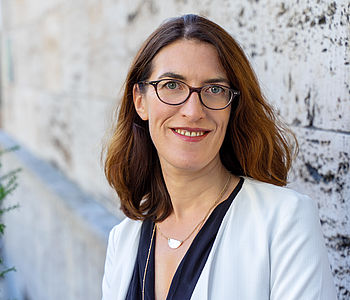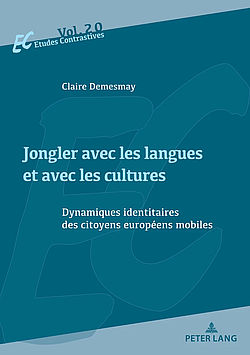Dr. Claire Demesmay | Associated Researcher

Home Institution
:
Sciences Po Paris
|
Position
:
Associate Fellow at CMB
|
Disciplines
:
Political Science
|
Biography
Claire Demesmay is an associate researcher at the CMB. Her areas of expertise are :
- Franco-German relations
- German and French Foreign/European Policy
- Role of civil society in international relations
- Identity representations of social actors
Claire Demesmay holds her PhD in political philosophy from the University of Paris 4-Sorbonne and the Technical University of Berlin. Before joining the DGAP in 2009, she worked at the Chair of French and Francophone Studies at the Technical University of Dresden (1998-2002), then as a researcher at the French Institute for International Relations (Ifri) in Paris (2002-2009). Between 2009 and 2021, she headed the Franco-German program at the German Council on Foreign Relations (DGAP).
Her recent publications include:
- Franco-German Relations seen from Abroad: Post-war Reconciliation in International Perspectives (Springer, 2020 – ed., with N. Colin)
- Idées reçues sur l’Allemagne. Un modèle en question (Common preconceptions about Germany. A model in question; Le cavalier bleu, 2018)
- Que reste-t-il du couple franco-allemand? (What remains of the Franco-German couple?; with Cécile Calla; La Documentation Française, 2013; Franco-German Parliamentary Prize 2016).
Researchtopic
Identity representations of social actors in an intercultural context
Identity representations and intergenerational transmission within Franco-German families
At the core of the project is the issue of generational transmission within bi/plurilingual families. The aim is to study the language practices and identities that parents and grandparents transmit - consciously or unconsciously - to their children and grandchildren, as well as the representations of language and bi-/plurilingualism that underlie their attitudes. In addition, the project aims to determine the extent to which children see themselves as the inheritors of particular bi-/plurilingualism practices and are willing to pursue them themselves or even pass them on to their own children.
Beyond language practices and strategies, the research focuses on the identity representations of members of bi-/plurilingual families and their interactions: to what extent do the language practices and strategies of the representatives of the three generations express a particular belonging? By which identity representations are they influenced? Do children assume, or not, the same type of identity as their parents and grandparents, and how does this identity translate into a bi-/plurilingual and bi-/pluricultural repertoire?
This project is gratefully supported by the Franco-German Civic Fund (Deutsch-Französischer Bürgerfond).
Representations, interactions and participation of young people from families with migration experience
The research project aims to study the impact of international exchanges on the representations, interactions and participation of young Europeans from families who have experienced migration. It is based on qualitative research, supported by a series of sociobiographical interviews conducted with young people participating in international exchanges, in this case Franco-German.
One of the objectives of the project is to analyze the different identities in which the social actors recognize themselves and/or claim to be, their articulation and the process of identity construction in the context of exchanges with young people from the neighboring country. In addition, we intend to study the way in which these exchanges translate into the acquisition of skills and influence the social participation of young people.
Jongler avec les langues et avec les cultures - Dynamiques identitaires des citoyens européens mobiles
January 01, 2024Claire Demesmay
Science, Société et Culture
Edition: Peter Lang
Collection: Science, Société et Culture
ISBN: 9782875745705
https://www.peterlang.com/document/1349045#
Résumé
Cet ouvrage explore les pratiques langagières et les représentations identitaires de « citoyens mobiles » au sein de l’espace européen. La mobilité intra-européenne débouche sur des rencontres humaines, dont sont issus des couples mixtes, eux-mêmes à l’origine de familles bi-/plurinationales. Ces migrants d’un genre nouveau renvoient à un phénomène migratoire encore récent et très minoritaire, encore peu étudié. En raison de la forte dimension géopolitique que revêtent les langues et les cultures, l’identité européenne est ici abordée à travers la transmission, l’acquisition et la gestion des compétences bi-/plurilingues et bi-/pluriculturelles. L’objectif est d’explorer la manière dont se décline, dans le contexte familial, le lien entre pratiques langagières et culturelles, d’un côté, et représentations identitaires, de l’autre.
L’analyse s’appuie sur des entretiens menés auprès de membres de familles franco-allemandes de Paris et Berlin – représentés au sein de trois générations. Issues des migrations intracommunautaires, ces familles sont à la fois des produits et des acteurs de l’intégration européenne, dont elles incarnent l’esprit au niveau d’existences individuelles et familiales. De plus, étant donné la particularité de la relation franco-allemande dans le contexte européen, on peut supposer que ces familles se reconnaissent dans une identité propre, qu’elles construisent et expriment à travers des pratiques langagières et culturelles spécifiques.
